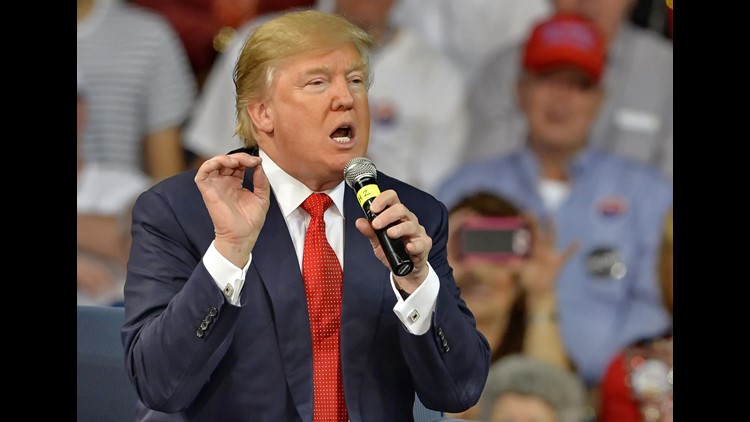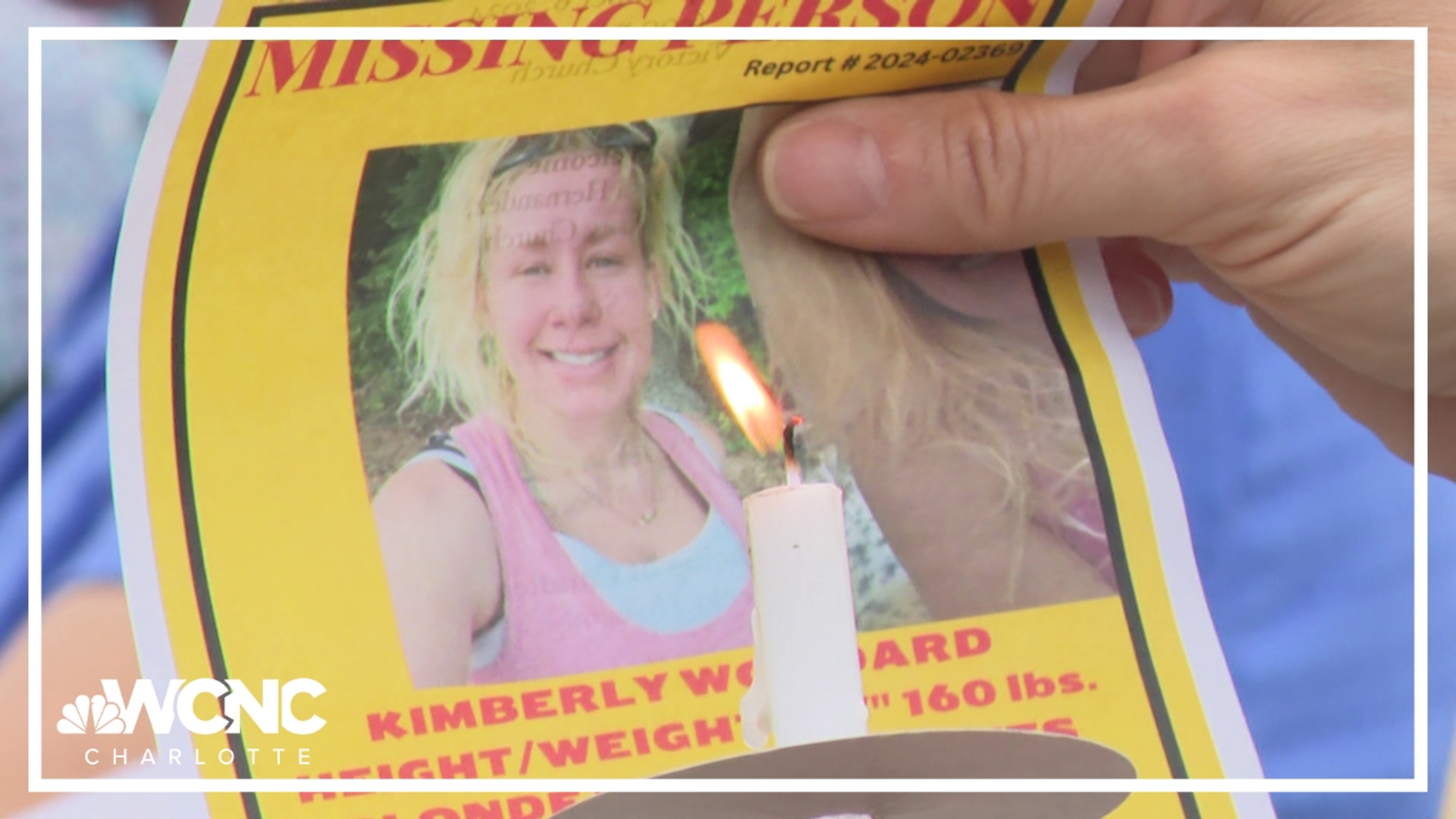INDIANAPOLIS — Republican presidential front-runner Donald Trump took aim at an Indianapolis manufacturer and promised thousands of supporters at the Indiana State Fairgrounds that he would stop jobs from moving overseas.
![635967722035623790-trumpindy.jpg [image : 83306498]](http://www.gannett-cdn.com/-mm-/c291beca6d528e02d7629c1467af18f070405696/c=0-0-2795-2389/local/-/media/2016/04/20/INGroup/Indianapolis/635967722035623790-trumpindy.jpg)
He also criticized the Republican nominating process — which has not been without controversy in Indiana — and expressed disappointment with the compliance of protesters during a speech at the fairground's Elements Financial Blue Ribbon Pavilion.
"Our country is going to hell," he told the crowd, citing illegal immigration, a trade deficit with China and the rise of the Islamic State. "When I’m running things, that stuff isn't happening. They’re going to respect us again."
![Trump says he has no plans to soften his style [oembed : 83324742] [oembed : 83324742]](/Portals/_default/Skins/PrestoLegacy/CommonCss/images/smartembed.png)
His appearance follows an important victory in his home state of New York and kicks off what will be an intense two weeks of presidential campaigning in Indiana ahead of the state's May 3 primary. His closest opponent, U.S. Sen. Ted Cruz of Texas, is scheduled to attend the Indiana Republican Party's Spring Dinner on Thursday. Ohio Gov. John Kasich, the only other Republican still in the race, is expected to be in the state on Tuesday.
Their decision to campaign here despite five primaries in Northeastern states next week is an indication of just how critical Indiana's 57 delegates could prove to be in the Republican race.
Hoosier voters usually get little attention from presidential candidates because the nominee is almost always clear well before Indiana's primary. But this year the state is expected to play an important role, especially on the Republican side where it remains unclear whether Trump can reach the required 1,237 delegates needed to win the nomination outright and avoid a contested national convention in Cleveland this summer.
![Donald Trump rally at the Indiana State Fairgrounds [gallery : 83278572]](http://www.gannett-cdn.com/-mm-/21dd7ab0c9837e04892282bfd740ab317ee33aa9/c=0-40-2800-2433/local/-/media/2016/04/20/INGroup/Indianapolis/635967720855889782-TrumpIndy-021.jpg)
In describing the stakes, Stephen Miller, Trump's senior policy adviser, put it this way: "Indiana has a chance to put this away for good."
It's no surprise, then, that Trump focused much of his hour-long speech on an issue dear to many Hoosier voters — manufacturing job losses. Indiana is the most manufacturing-intensive state in the nation.
"You're looking at a situation where the jobs are being ripped out of our states, out of our country, like candy from a baby," he said.
![Arkansas brothers plow money into anti-Trump efforts [oembed : 83324750] [oembed : 83324750]](/Portals/_default/Skins/PrestoLegacy/CommonCss/images/smartembed.png)
He lambasted massive layoffs at air conditioner manufacturer Carrier's plant in Indianapolis. The company and its affiliates announced in February they would eliminate 2,100 Indiana jobs as they move production to Mexico. The layoffs have been a favorite target of Trump, who said Wednesday he would "tax the hell" out of the company.
"You’re going to bring it across the border, and we’re going to charge you a 35% tax," he said. "Now within 24 hours they’re going to call back. 'Mr. President, we’ve decided to stay. We’re coming back to Indianapolis.'"
![Donald Trump: A look at his career and 2016 campaign [gallery : 71094094]](http://www.gannett-cdn.com/-mm-/868e529954db168eab8dee1f73595e9ebc2c6d03/c=0-0-1605-1372/local/-/media/2015/06/11/USATODAY/USATODAY/635696477757628268-trump02.jpg)
At one point, Trump asked how many Carrier employees were in the audience of several thousand. A few people raised their hands. The union representing 1,400 of those Carrier workers voted to endorse Bernie Sanders for president.
Still, Trump's message resonated with many in the crowd. Doug Lantz, a 28-year-old steel welder from Greenfield who makes parts for Carrier and John Deere, said he liked Trump’s denouncement of Carrier’s move to Mexico and his promises to protect manufacturing jobs in the U.S.
![Doug Lantz, steel welder from Greenfield, Ind. [pullquote : 83324784]](/Portals/_default/Skins/PrestoLegacy/CommonCss/images/pullquote.jpg)
“It’s nice to have someone who’s going to fight to keep it here,” he said. “I’m voting where my guns are safe, where my jobs are safe, where my money’s safe.”
Trump also took aim at the Republican nominating process as he has in other states after failing to win over delegates.
"It’s a rigged system," he said. "It’s rigged for the lobbyists. It’s rigged for the donors. And it's rigged for the special interests."
He didn't specifically refer to Indiana's delegate selection process, which his campaign has criticized as "flawed" and "easily manipulated." State and district party leaders selected Indiana's 57 delegates to the national convention last week, even though Indiana's primary isn't until May 3. Few of the delegates support Trump, which could be detrimental in a contested national convention.
Kasich's campaign, meanwhile, said this week it secured the support of most of Indiana's delegates in the event that no nominee reaches the necessary 1,237 delegates, meaning the delegates are free to support another candidate in a contested convention.
Earlier in the day, Trump met with Gov. Mike Pence, who is considering whether to endorse ahead of the GOP primary. New Jersey Gov. Chris Christie, one of the first prominent Republicans to endorse Trump, also attended the private meeting at the Indiana governor's residence at Trump's invitation.
Pence listened to Trump's plans for the country, described Indiana's economic success and expressed his desire to have a strong partner in the White House, his spokeswoman said.
![Kasich camp indirectly seeks cash for anti-Trump PACs [oembed : 83324764] [oembed : 83324764]](/Portals/_default/Skins/PrestoLegacy/CommonCss/images/smartembed.png)
At the Trump rally, about 150 protesters gathered outside and some made it into the venue. Several were removed by police, but without the kind of physical altercations that have marked Trump's rallies elsewhere.
Many of those in attendance said they liked Trump's positions on national security and his pledge to build a wall on the Mexican border and "get rid of ISIS so fast that your head will spin."
Trump said he would encourage the use of waterboarding and even harsher techniques in the fight against terrorism.
"They said what do you think about waterboarding Mr. Trump? I said, 'I love it!'" he said. "They can put people in steel cages, 25 to 50 people and drop them in the water and pull them up an hour later and we can’t waterboard them? How stupid are we?"
So far there has been no public polling in Indiana, making it difficult to determine how much support Trump has in the state. But what is clear is this: Without a strong showing here, his path to the nomination is in doubt.
“(Indiana) is the next big game that doesn’t have a clearly identifiable outcome yet," said Andy Downs, director of the Mike Downs Center for Indiana Politics. "Losing in Indiana makes it very difficult mathematically to get to the number of delegates needed, so he needs to win here."
Contributing: Chelsea Schneider, Amy Bartner, Stephanie Wang, Madeline Buckley and Brian Eason, The Indianapolis Star. Follow Tony Cook on Twitter: @indystartony



